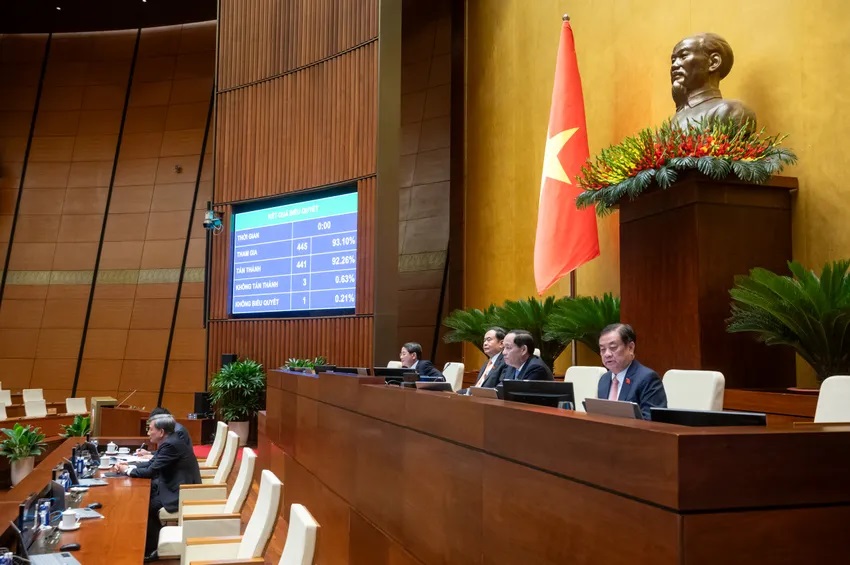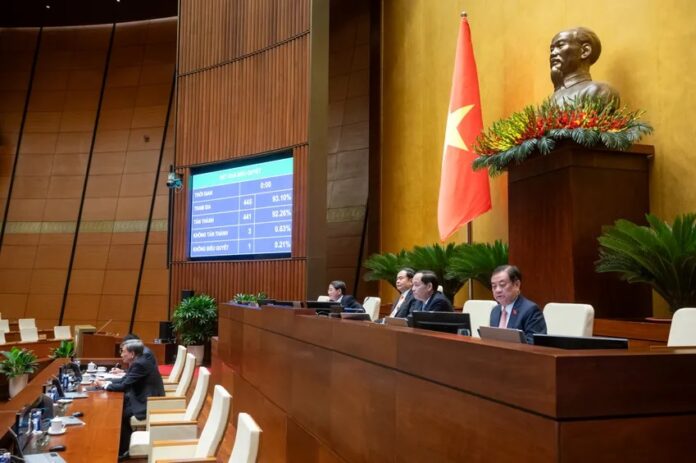On June 14, with the majority of delegates present in favor, the National Assembly passed the Law on Digital Technology Industry with 6 chapters and 51 articles.
Building a talented workforce in digital technology and AI
Presenting the report on explanations, reception, and edits to the bill, Mr. Le Quang Huy, Chairman of the Committee for Science, Technology, and Environment, said that one of the notable new points in the draft Law on Digital Technology Industry is the policy to attract and develop talented human resources in digital technology.
According to the National Assembly Standing Committee (NA Standing Committee), the bill uses the term “digital technology talent” to refer to individuals with outstanding qualifications, experience, and contributions in the field of digital technology, including both the public and private sectors.
“This is a field with a very high rate of innovation, so developing high-quality human resources is a crucial issue,” said Mr. Huy.
 National Assembly passes the Law on Digital Technology Industry on the morning of June 14. Photo: Pham Thang
|
The bill clearly defines the criteria for evaluating talent, referring to the Law on Science, Technology, and Innovation to ensure feasibility and transparency in organization and implementation. This is expected to create a legal basis for the selection, utilization, and appropriate treatment of talented individuals in the era of digital transformation.
Regarding artificial intelligence (AI), the bill has been edited to incorporate the suggestions of the National Assembly deputies, focusing on training and improving AI skills within and outside the state agency system.
Specifically, Article 18 of the bill promotes training, retraining, and skill improvement in digital technology (including AI) within the national education system. At the same time, the law also encourages enterprises and state agencies to proactively develop human resource strategies that meet the requirements of Industry 4.0.
Not only focusing on training, but the bill also identifies AI as a key area that needs priority in research, development, and application, as stated in Article 43. These contents will serve as the foundation for developing policies to support in-depth AI research and specialized training.
Establishing a legal framework for digital assets
The Chairman of the Committee for Science, Technology, and Environment also said that the bill provides general principles for establishing a legal framework for digital assets, a very new field that is rapidly developing and potentially legally risky.
According to the law, digital assets are a form of property as defined by the current Civil Law. However, instead of issuing a separate law, the Law on Digital Technology Industry takes a general principle approach and authorizes the Government to detail the contents of digital asset management based on practical needs and development.
 |
Specifically, Clause 1, Article 49 states that the management contents include: creation, issuance, transfer, establishment of ownership rights of digital assets; rights and obligations of parties involved in related activities; ensuring information security and cyber security; preventing money laundering and terrorist financing… Notably, the bill requires controlling the business of digital asset services, including encrypted assets.
The NA Standing Committee believes that this approach will ensure flexibility, feasibility, and consistency with international practices, while also laying the foundation for effective management of digital assets in the future.
REPORTER GROUP
– 09:45 14/06/2025
From the Han River Miracle to the International Financial Center: “Da Nang Can Emulate Dubai”
Within just one year, from 2022 to 2023, the UAE has successfully attracted billions of dollars in additional investment into the digital asset sector. As a result, Dubai has witnessed a significant influx of businesses operating within this space, solidifying its position as a leading hub for digital asset enterprises.
What Does Da Nang Need to Become the Capital of Digital Assets in Southeast Asia?
Danang is emerging as a new hub for digital assets in Southeast Asia. However, to turn this potential into reality, the city needs a legal framework that is open, transparent, and supportive of innovation in the blockchain and digital asset space.





















